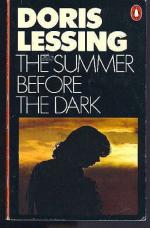|
This section contains 781 words (approx. 3 pages at 300 words per page) |

|
SOURCE: Sampson, Anthony. “Wild, Heady Days.” New Statesman 126, no. 4358 (31 October 1997): 43-5.
In the following review, Sampson highlights the passion of Lessing's memories in Walking in the Shade.
Of all the free spirits of London in the late 1950s, Doris Lessing appeared the most free. She seemed to have floated in from Africa with a freshness and passion which radiated both from her writing and her presence. She was separate from other cliques and backgrounds, but in the midst of radical protests, antiapartheid, anti-bomb, anti-censorship. And she wrote about everything with the directness and originality of an outsider.
It was true she was a communist, with a commitment to her causes that was first forged by her intense small group of comrades in Rhodesia (now Zimbabwe), which she vividly described in her first volume of autobiography, Under My Skin.
But her loyalty was linked to the fight against white...
|
This section contains 781 words (approx. 3 pages at 300 words per page) |

|


